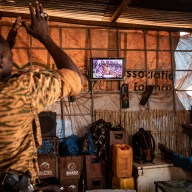Although many may not realize it, there’s actual biological value in having experiences with nature, value that is measurable and quantifiable.
When your mom told you to go outside and play she really did know what was best for you. Having access to the natural world has been proven to have physical and mental health benefits. And research has found the more diverse and vibrant an ecosystem is, the healthier it is for us.
One of my personal favourite places is Haida Gwaii — the Queen Charlotte Islands — off the coast of British Columbia. The diversity of life there in the cold nutrient-rich waters, on the shorelines and in the old-growth forests, is astonishing. I’m hardly alone. Lodges and retreats are popping up all along B.C.’s pristine mid and north coast as people search for places to get away from the stress of their daily lives.
People gravitate to these kinds of places, they usually say, because they are beautiful, peaceful or relaxing. Sometimes they will venture as far as calling experiences with these ecosystems uplifting, moving — even spiritual.
Although many may not realize it, there’s actual biological value in having experiences with nature, value that is measurable and quantifiable. General health, mental fatigue and physical injury all recover faster when patients have access to natural areas.
The latest evidence comes from a study in the science journal Biology Letters. It reports the psychological benefits of urban green spaces increase with the diversity of life found in them. Researchers interviewed more than 300 park-goers in the medium-sized city of Sheffield, England, and compared their answers to an analysis of the biodiversity of their parks.
While the overall size of a park influenced the visitor’s perception of how it made them feel, even more important was the diversity of life. Bigger parks made people feel better. But species-rich parks were even more beneficial.
As it turns out, when it comes to our health and well-being not all parks are created equal. Simply providing a grass field, for example, is likely to be far less beneficial than a natural area with a greater diversity of plant and animal life. We now know humans are able to, consciously or otherwise, judge the overall diversity and vibrancy of green spaces. What’s more, the more diverse and vibrant those ecosystems are, the greater their value to humanity in terms of our own personal health and well-being.
With three-quarters of Canadians now living in urban areas, we must hope our city planners and politicians are paying attention to this kind of research. It underscores the need to both protect our most diverse ecosystems, and to design our cities to have larger and more green spaces. Ultimately, our health depends on it.
Take David Suzuki’s Nature Challenge and learn more at www.davidsuzuki.org.
David Suzuki & Dr. Faisal Moola for metro vancouver
Dr. David T. Suzuki is an award-winning scientist, environmentalist and broadcaster. He is the co-founder of the David Suzuki Foundation in Vancouver where he lives with his wife and two daughters.
















